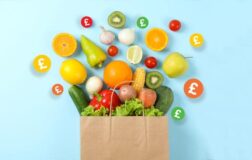Best study snacks to help you revise
Choosing the right brain food during exam period will help you de-stress, sleep better and keep pennies in your pocket. We've researched the best options!

Credit: smspsy, Melica,Hong Vo, Anton Vierietin, bergamont – Shutterstock
When you're stuck in the library till late, it's tempting to grab a snack from the vending machine or library cafe to lower your stress levels with a quick sugar injection. However, not only will this burn a great big hole in your pocket, it's not great brain food either.
We've done some research into finding out which are the best foods to eat during times of high stress, and when you need to keep focused for long slogs of time.
It's crazy how much your diet can affect the way you function when you've got deadlines approaching. Eating the right foods can keep you motivated and healthy. And if you play it smart, you can get this all comfortably within your weekly budget!
What's in this guide?
Best healthy study snacks
Here are the best brain foods for studying:
-
Fresh veggie sticks
Chop up some carrots, celery, cucumber or any other raw vegetable you fancy. Just make sure they're nice and fresh, making a ‘crunch’ sound when you bite into them (much to the annoyance of those sitting next to you, but who cares – you put up with their crisp munching).
These sorts of snacks are easy to carry around (you can even just stick them in a plastic food bag) and the process of biting into them actually works as a bit of stress relief in itself.
When you feel the tension building up, don’t get angry at yourself for not revising earlier and spiral into a pit of despair – take it out on a carrot stick.
-
Nuts

Credit: Indigo Photo Club – Shutterstock
Nuts are full of good fats and magnesium, which helps keep cortisol (stress) levels low. Like the veggie sticks above, the physical distraction of munching on nuts one by one can work as an edible stress ball whilst giving you loads of useful energy.
An added bonus is that walnuts are particularly good for improving your memory as they're full of omega 3 and polyphenols (also good for stress).
-
Asparagus
Bit of a weird one, but apparently since asparagus is packed full of vitamin B, it's the ideal snack for de-stressing.
It can, however, turn your pee a funny colour, and we're not sure it's that practical a library snack. Worth bearing in mind anyway.
Stress getting the better of you, and snacks not hitting the spot? We've got some tips on how to deal with exam stress. -
Berries
Pretty much all berries are packed with vitamin C which is good for loads of things, particularly reducing stress and keeping your immune system strong.
This is handy during exam period since, as we all know, this is the time when everyone around you starts getting sick (yourself included).
Berries can be expensive, but try buying them frozen from the supermarket and separating them into freezer bag portions. You can then take a portion out of the freezer each day.
-
Bananas
Bananas are amazing for a number of reasons. For a start, they're full of vitamin B-6 which is great for producing happy hormones by boosting the serotonin levels in your body.
Bananas also keep your blood pressure down and regulate your blood sugar levels, which will help prevent the feeling that the world is ending when the days before exam time start closing in. Keep calm and grab a banana.
Watch out though – they do tend to ripen quite quickly. Make sure you store them properly to make them last longer.
-
Dried fruit
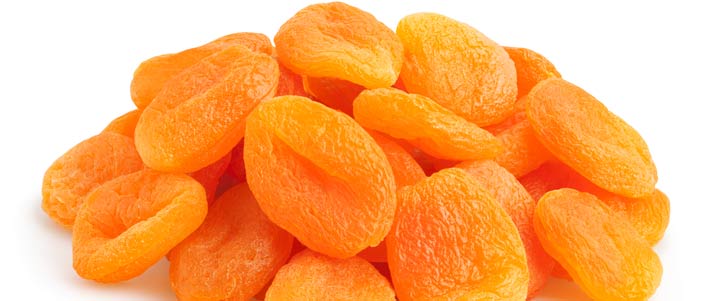
Credit: Bergamont - Shutterstock
They might look a bit weird and wrinkly, but dried fruits are really good for you, as they're full of fibre, iron, potassium and antioxidants.
According to the NHS, just 30g of dried fruit counts as one of your five a day. However, they advise eating them at the same time as meals rather than as a snack on their own to reduce the impact on your teeth.
So, while dried fruit can still be good to eat during exam periods, it's better to eat them with your breakfast or lunch (or dinner if you'd prefer) rather than snacking on them throughout the day.
-
Oatmeal
Oats are really high in magnesium, vitamin B6 and potassium, making them great for combatting anxiety.
Try making your own oatmeal flapjacks at home (with honey or agave syrup in place of sugar) and taking them to uni with you. They're a brilliant, slow-burning energy treat.
-
Dark chocolate
Tons of research has shown that dark chocolate is good for you – we had to include it here.
Not only will it satisfy any chocolate cravings you have, but it has also been proven to produce endorphins, increase blood flow to the brain and provide just the right amount of caffeine to give you a kick without making you crash.
Although make sure you go for chocolate that's 70% cocoa and above (none of that sweet, milky stuff) and beware that small quantities are really important here – stick to nibbles.
What to drink when revising
We all know that familiar but indescribable stench that floats around the library during exam period – the unmistakable honk of energy drinks. Red Bull, Monster, Rockstar... whatever your poison, it might 'give you wings' for an hour or so, but you'll come crashing down pretty hard when it wears off.
Research has shown that whilst these drinks – as well as other heavily caffeinated drinks like strong coffee – help you focus in the short term, the benefits wear off pretty quickly.
It's also really easy to drink too much without realising and this will increase your stress levels massively as your heart starts pumping too fast. If you've ever experienced this before, you'll know the results ain't pretty.
A great alternative drink during study time is to opt for sipping cups of tea instead (this is aside from your 6–8 glasses of water, of course, which are crucial for brain health).
Black tea, green tea and oolong tea are all great options. Not only do they contain just the right amount of caffeine to give you a boost, but they also contain theanine which, when combined with the caffeine, works well to improve your focus.
Brain food recipes to help you revise
Here is how to make some of the best brain food for studying:
A simple potato salad
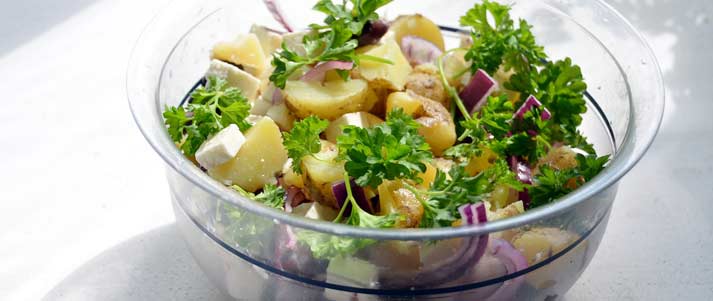
Ingredients
Serves: 4 | Costs: £0.83 (£0.21 per serving) | Time taken: 12 mins
- 1 handful of chopped chives (£0.50)
- 400g of potatoes (£0.28)
- 1 tablespoon of mayonnaise (£0.03)
- 1 teaspoon of mustard (£0.02).
Method
- Boil the potatoes for around 10 minutes
- Add mayonnaise and a bit of mustard
- Add freshly chopped chives (or spring onion).
Try adding some greens to your potatoes for a bit of fibre (and colour). An easy pleaser is to throw a handful of frozen peas in with the boiling potatoes about a minute before they're done.
This could also be your opportunity to add some asparagus if you're up for that extra B6. Just cut off and discard the rough, woody ends and throw them in with the potatoes about two minutes before draining them, then chop and add to the salad.
Chicken pesto salad
Ingredients
Serves: 4 | Costs: £5.51 (£1.38 per serving) | Time taken: 15 mins
- 400g of chicken (£2.99)
- 1 mixed leaf salad (£1)
- 330g of cherry tomatoes (£1.05)
- 3 tablespoons of pesto (£0.45)
- 1 splash of oil (£0.02).
Method
- The night before, cook your chicken in a frying pan using a little bit of oil (you could also just buy a pack of pre-cooked chicken from the supermarket if it's cheap).
- Add some pesto to the chicken (red pesto goes brilliantly with chicken) and wait for it to cool overnight.
- In the morning, add it to a bed of leafy green salad and cherry tomatoes. This will combine the freshness of the salad with protein, which is a slow energy releaser – perfect for keeping you focused for longer periods of time.
Omelette muffins
Ingredients
Serves: 4 | Costs: £2.90 (£0.73 per serving) | Time taken: 25 mins
- 2 peppers (£1.18)
- 8 eggs (£1.04)
- 110g of cheese (£0.68).
Method
- Preheat the oven to 180°C
- Chop the peppers, grate the cheese and whisk the eggs
- Mix all ingredients in a bowl
- Pour the mixture into muffin tins and cook for 20–25 minutes.
Yoghurt and granola
Ingredients
Serves: 4 | Costs: £0.85 (£0.21 per serving) | Time taken: 2 mins
- Granola 200g (£0.50)
- Low-fat yoghurt 500g (£0.35).
Method
- Simply add the granola to the yoghurt and you're done
- You can also add any fruit or honey you've got in the kitchen for some extra flavour while keeping it nutritious.
Avocado on toast with egg
Ingredients
Serves: 4 | Costs: £2.31 (£0.58 per serving) | Time taken: 10 mins
- 2 avocados (£1.60)
- 4 eggs (£0.52)
- 8 slices of wholemeal bread (£0.17)
- 1 splash of oil (£0.02).
Method
- Fry your eggs with a splash of oil in a frying pan
- Pop the toast in the toaster
- Cut the avocado and put it on your toast
- When the eggs are done, put them on top of your avocado.
Homemade hummus and carrot sticks
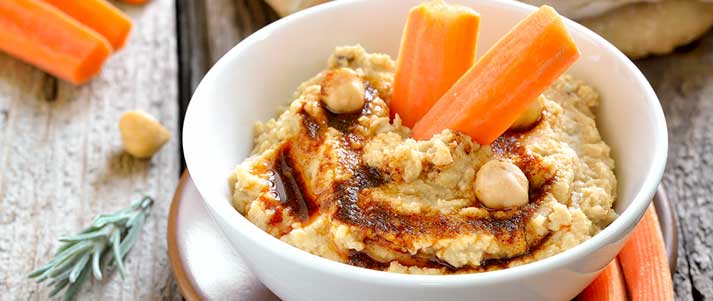
Credit: Fortyforks – Shutterstock
Ingredients
Serves: 4 | Costs: £0.97 (£0.24 per serving) | Time taken: 10 mins
- 1 lemon (£0.30)
- 110g of chickpeas (£0.22)
- 4 carrots (£0.40)
- Clove of garlic (£0.05).
Method
- Drain the chickpeas and place them in the blender with the garlic and the juice of one lemon
- Blitz the ingredients together and season to taste if needed (you can add other flavourings like tahini paste or chilli powder)
- Chop up the carrots and your snack is ready to eat.
Celery with cream cheese
Ingredients
Serves: 4 | Costs: £1.54 (£0.39 per serving) | Time taken: 2 mins
- Cream cheese 200g (£0.85)
- Celery (£0.69).
Method
- Cut up the celery
- Add a scoop of cream cheese (you can also add in some extra herbs and spices if you have any in the kitchen cupboard).
Cheese and crackers
Ingredients
Serves: 4 | Costs: £0.78 (£0.20 per serving) | Time taken: 5 mins
- Cheese 100g (£0.62)
- Crackers 100g (£0.16).
Method
- Cut the cheese into slices
- Pop it on a plate with some crackers.
If you find yourself glued to your desk all day, cheese and crackers can give you a good excuse to have a short break and stretch your legs. Getting up to slice the cheese and arrange it on biscuits takes just enough time to let your mind switch off, without getting in the way of your work.
Popcorn
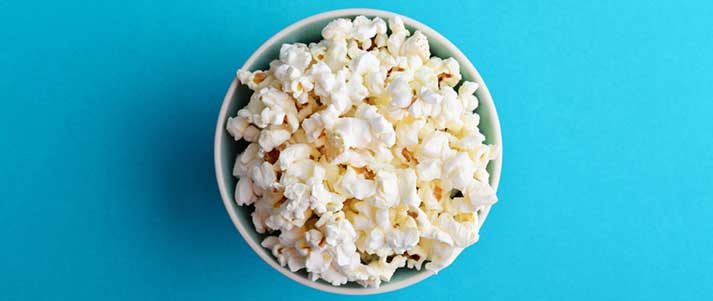
Credit: mama_mia – Shutterstock
Ingredients
Serves: 4 | Costs: £0.99 (£0.25 per serving) | Time taken: 1 min
- Popcorn (£0.99).
Think popcorn's just for the cinema? Think again. It also makes a pretty great revision snack.
A bag of microwave popcorn is even healthier without the added salt and sugar, and means you get fresh, warm popcorn (yum).
Homemade soup
Soups are an amazing lunch option as you can make a pot at the start of the week and it will last for ages (freeze single portions in old butter tubs and defrost when you need them).
Go for something filling such as sweet potato and carrot, or check out our leftovers soup recipes for more inspiration (including one which can be made for as little as £0.18 per serving). You can take your soup to uni with you in a thermal flask to save money on lunch.
Don't forget to check out the other budget-friendly student recipes on our food page. Bon appetite, and good luck!
Our delicious fish and pesto recipe is yet ANOTHER cheap and healthy meal to add to your arsenal.
* Prices were correct at the time of writing (using Tesco.com prices as guidelines).

